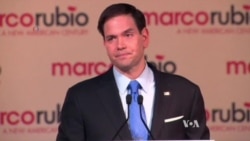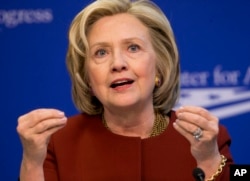Florida Senator Marco Rubio officially joined the 2016 presidential race Monday. He’s the third Republican to announce a White House bid, and his announcement came one day after Democrat Hillary Clinton launched her second presidential campaign.
Rubio vowed to move the country beyond the politics of the past to what he called "a new American century."
He also took a swipe at Clinton’s entrance into the presidential race on Sunday. "Just yesterday, a leader from yesterday began a campaign for president by promising to take us back to yesterday," he said to boos from the crowd. "Yesterday is over. There is no going back."
The candidate announced his campaign in downtown Miami in front of the Freedom Tower, a processing center for tens of thousands of Cuban exiles who fled the island nation in the 1960s and 1970s.
"Grounded by the lessons of our history but inspired by the promise of our future, I announce my candidacy for the presidency of the United States!" he said.
Compelling biography
At 43, Rubio is the youngest candidate in the field so far, and offers Republicans the potential of winning over some younger voters as well as Hispanic Americans. He’s the son of Cuban immigrants who came to the U.S. shortly before Fidel Castro took power in 1959.
Rubio’s unique biography will be a major focus of his campaign, said Republican strategist Ford O’Connell.
"He has the most compelling narrative of the entire Republican field," O’Connell said. "The question is, how does he package it going forward so that voters know who he is and what it is he stands for? In a lot of ways, he does represent the American dream."
Political challenges ahead
Rubio is the third first-term Senate Republican to join the presidential field, following in the footsteps of Ted Cruz of Texas (who also has Cuban roots) and Rand Paul of Kentucky.
Rubio won his Senate seat in 2010 thanks in part to strong support from Tea Party activists. But his subsequent backing of a bipartisan immigration reform bill that included a path to citizenship for millions of people living in the U.S. illegally angered Tea Party groups. He may have his work cut out for him to win back their support.
Public opinion polls show Rubio running in the middle of the Republican pack for the moment, trailing his political mentor, former Florida governor Jeb Bush, and current Wisconsin Governor Scott Walker.
Foreign policy focus
In his announcement, Rubio made it clear he will continue as an unwavering critic of President Barack Obama’s foreign policy. He vowed that, with his election, America would "once again [accept] the mantle of global leadership by abandoning this administration’s dangerous concessions to Iran and hostility to Israel."
Rubio has used his seat on the Senate Foreign Relations Committee to become a stalwart critic of Obama’s foreign policy. He was one of 47 Senate Republicans who signed a letter to Iran’s leaders warning that any nuclear deal they reach with the Obama White House might not survive once Obama leaves the presidency in early 2017.
Rubio has become a leading Senate hawk on dealing with the threat from Islamic State and in confronting Russia over its ambitions in Ukraine.
Expect Rubio to be front and center during Foreign Relations Committee hearings in the weeks ahead, strategist O’Connell predicted. "He will do it on the back of national security and military policies because that is essentially what he has been selling himself as, particularly with his Senate experience."
Senate competition
The Senate could become even more lively than usual with Rubio, Cruz and Paul all vying for the White House at the same time. A fourth senator, Lindsey Graham of South Carolina, also is mulling a presidential bid. Graham often teams with Senator John McCain as one of the leading Republican hawks and a harsh critic of the Obama foreign policy.
The Rubio announcement came just one day after former Secretary of State Clinton launched her second presidential campaign with a highly produced Web video that put the focus more on voters and less on Clinton.
"Everyday Americans need a champion and I want to be that champion," Clinton said in the video kicking off her campaign.
Clinton is now moving on to early contest states such as Iowa and New Hampshire, where she will meet with small groups of voters. It’s a far different rollout from her 2008 campaign, when she ultimately lost a bruising primary campaign to Obama.
Recent polls show if the election were held today, Clinton would beat all Republican candidates by a landslide.
But Republican National Committee head Reince Priebus said he believes voters do not trust her.
"Over decades as a Washington insider, Clinton has left a trail of secrecy, scandal and failed policies that cannot be erased from voters' minds," he said.
They include the deadly terror attack on the U.S. consulate in Benghazi, Libya, and using an unofficial email account for official business as secretary of state. Republicans also are likely to bring up scandals involving her husband, former President Bill Clinton.
"I believe our very identity as an exceptional nation is at stake, and I can make a difference as president," he said.
Referencing his Cuban-born parents, a bartender and maid, the lawmaker said, "America doesn’t owe me anything, but I have a debt to America that I must try to repay.… America is literally the place that changed my family’s history."
His comments prompted periodic, enthusiastic outbursts from a crowd of supporters, who clapped, whistled and shouted "Marco! Marco!"
Rubio, who rode the Tea Party wave of 2010 to national prominence, is making muscular foreign policy a focal point of his campaign, portraying himself as the Republican most ready to handle threats to America in a chaotic world.
A video promoting the announcement casts Rubio's campaign as a "new direction for America." It features clips of speeches in which he promotes the need for strong U.S. leadership in the world and criticizes President Barack Obama's policies.
In his video and campaign announcement, Rubio said the American dream is slipping from too many families' grip, and young people face unequal opportunities to succeed. It was a message honed to pitch the GOP as a party that cares about all voters, not just those in upper tax brackets.
Republican field
Rubio is the third Republican to compete for the party's nomination for the 2016 election, joining fellow Senators Rand Paul and Ted Cruz. Wisconsin Governor Scott Walker and former Florida Governor Jeb Bush are also expected to run.
A first-term senator, Rubio will no doubt hear his rivals tell voters he's not ready for the White House. To counter that, Rubio has outlined specific policy proposals that boost him as a policy expert, both on foreign and domestic issues.
On Tuesday, on his first day as an official candidate, he is set to return to Washington to join a Senate hearing on a proposed deal with Iran on its nuclear ambitions.
Right now, Rubio's support registers in single digits in opinion polls of the likely contenders in what is expected to be a crowded Republican presidential field. But aides believe Rubio, who was on 2012 nominee Mitt Romney's short list for vice president, will rise in the polls when voters take a closer look at him.
If elected, Rubio would become the nation's first Hispanic leader.
Clinton announces
Former Secretary of State Hillary Clinton kicked off her campaign by hitting the road on a multistate trip starting in Iowa, home of the country's first presidential caucus.
Clinton announced her candidacy as the Democratic nominee Sunday in an online video in which she promised to work for the middle class.
"Everyday Americans need a champion and I want to be that champion so you can do more than just get by," Clinton said. "You can get ahead and stay ahead. Americans have fought their way back from tough economic times. But the deck is still stacked in favor of those at the top."
Some material for this report came from Reuters and AP.







